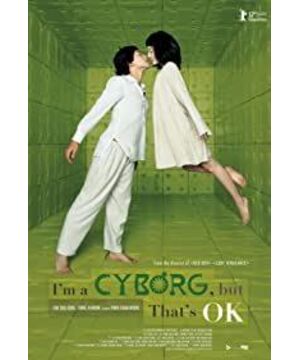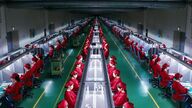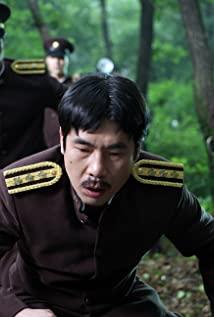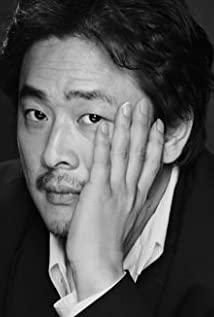"You can't work too hard, you will become a robot!"
Perhaps influenced by Chaplin's Modern Times, psychosis has been a staple of genre films for eight decades. But in most movies that deal with mental illness, psychopaths tend to be supporting characters, and psychopaths in movies are mostly harlequins, either scary or funny. There are very few movies that take mental patients as the protagonists and look at the world from the perspective of mental illness, and the 2006 Korean movie "It Doesn't Matter for Cyborgs" to be mentioned this time is one of such movies.
In fact, "The Cyborg Doesn't Matter" also has a more widely known translation name, called "Robot Love". Although the latter will attract audiences who want to watch sci-fi romance films, the former is a bit obscure as a title, but it can better reflect the crux of the story, and the director of this movie is not an ordinary person--yes, he made "Old Boy" "Park Chan-wook of the gorgeous and brutal films like "Kind Gold" and "Miss" - people don't want to make a pure fantasy film, and there must be some private goods. What's even weirder is that Park Chan-wook said, "I want to make a movie for my 12-year-old daughter, and I hope she likes it." For a director with a strong style to create a movie under such a motive, the style of painting is a bit strange.
Cyborg Doesn't Matter The story alone is already weird. A granddaughter who was brought out by a mentally ill grandmother was sent to a mental hospital because of an accident and a psychotic outbreak. She fantasized about being a robot. Then she met a male patient who also had hallucinations, and met and fell in love with him... ...In such a story, normal people are just paper characters with few scenes, and the whole film shows part of the daily life of mental patients in a mental hospital. In fact, before "The Cyborg Doesn't Matter", there were also several movies that completely let the mentally ill play the leading role and showed the living conditions of the mentally ill. The most famous in the West is of course "One Flew Over the Cuckoo's Nest", which is a classic among Oscar-winning films; the most famous in the East is "Dream Traveler" directed by Shunji Iwai, which also tells the love between mentally ill. But after all, the first protagonist of "Flying Over the Cuckoo's Nest" is not a real mental patient, and the group portraits of mental patients are more to convey the creator's critical thoughts; "Dream Traveler" often uses the world of normal people to contrast the image of mental patients. Somber, and mentally ill with a past that they can't look back on. In addition, both films make the audience feel that the mentally ill are far away from our lives, and the effect is still similar to the curiosity.
But most of the characters, including the protagonist, in "The Cyborg Doesn't Matter" are also mentally ill, but they look more energetic than normal people, and the overall image is sunny and cheerful. And judging from the history of every mentally ill patient, they used to be just like you and me. They were all normal people. The mental illness is nothing more than the influence of the environment and the pressure of life, but even if they suffer from mental illness Even though they were mentally ill and admitted to a mental hospital, they still love life just like normal people. On the contrary, once the few normal people who play soy sauce in the film have a role, they act more like mental illness. In addition, Park Chan-wook used Rain, who was a well-known idol at the time, and Lim Soo-kyung, who appeared in "I'm Sorry, I Love You", as the leading roles, supplemented by the vivid interpretation of mental patients by excellent supporting roles in the Korean film industry, which not only made the characters three-dimensional and vivid, but also It brings the distance between the audience and the mentally ill, rather than the marginalized spectacle of "One Flew Over the Cuckoo's Nest" and "Dream Traveler". On the premise that there is no typical dramatic conflict such as confrontation between good and evil, intrigue, etc., the progress of the plot of "cyborgs doesn't matter" is inseparable from the mental opening of mental patients. It just so happened that Park Chan-wook's always magical audio-visual style came in handy, and all the housekeeping skills that he used to save in "Old Boy" and "Kind Gold" before were used: meticulous composition, smooth movement of mirrors, and exquisite costumes. Dao, ingenious montages...and "It Doesn't Matter" is probably Park Chan-wook's best use of computer effects. With just the right amount of computer effects, the strange fantasies of psychopaths are all colorfully displayed on the screen. Combined with the relaxed and witty classical wind orchestral music, from the viewing point of view, it is not an exaggeration to say that this movie is an adult fairy tale. Another difference between "The Cyborg" is different from most movies of the same theme, which is the handling of the ending. The film is neither like "One Flew Over the Cuckoo's Nest" choosing to climax with resistance, nor like "Dream Traveler" ending in tragedy. On the surface, the male patient (Rain) pretends to take the delusional heroine (Lin Xiujing) to "charge" outdoors in the thunderstorm, but in fact he releases his heart together. In the process of getting along with the male patient, the heroine gradually got rid of the burden of "robots"; the male patient also got redemption in his heart by helping the heroine. In the end no one died and no one suffered. In fact, when I first started watching this ending, I was also surprised that Park Zanyu left such a harmless ending, but thinking about it, in his works before and after, there have been enough tragedies, so why not be positive?
Of course, even a movie like "It Doesn't Matter With Cyborg" can't shake the overall spectacle image of the mentally ill on the screen. However, watching the mentally ill in the movie, we cried and laughed, and we may need to think about it later: Is the boundary between us, as normal people, and the mentally ill really clear? Has anyone ever thought that the past of the mentally ill may be our present?
View more about I'm a Cyborg, But That's OK reviews











